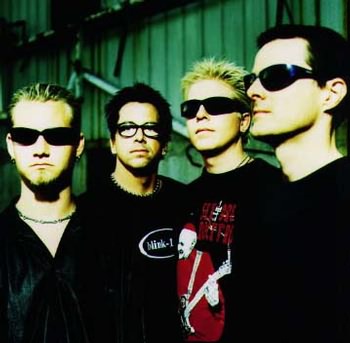| B i o g r a p h y |
 The Offspring's
metal-inflected punk became a popular sensation in 1994, selling over
four million albums on an independent record label. While the group's
credentials and approach follow the indie rock tradition of the '80s,
sonically they sound more like an edgy, hard-driving heavy metal band,
with their precise, pulsing power chords and Dexter Holland's flat vocals.
The Offspring's
metal-inflected punk became a popular sensation in 1994, selling over
four million albums on an independent record label. While the group's
credentials and approach follow the indie rock tradition of the '80s,
sonically they sound more like an edgy, hard-driving heavy metal band,
with their precise, pulsing power chords and Dexter Holland's flat vocals.
Featuring Holland, guitarist Kevin "Noodles" Wasserman, bassist Greg Kriesel, and drummer Ron Welty, the Offspring released their self-titled debut album in 1989. Four years later, their second album, Ignition, became an underground hit, setting the stage for the across-the-board success of 1994's Smash. The Nirvana sound-alike "Come Out and Play," the first single from the album, became an MTV hit in the summer of 1994, which paved the way to radio success. The band was played on both alternative and album rock stations, confirming their broad-based appeal. "Self Esteem," the second single, followed the same soft verse/loud chorus formula and stayed on the charts nearly twice as long as "Come Out and Play." The group got offers from major labels, yet they chose to stay with Epitaph. While they were able to play arenas in the U.S., their success didn't translate in foreign countries. Nevertheless, the band's popularity continued to grow in America, as "Gotta Get Away" became another radio/MTV hit in the beginning of 1995. The Offspring recorded a version of the Damned's "Smash It Up" for the Batman Forever soundtrack in the summer of that year; it kept the band on the charts as they worked on their third album.
Following a prolonged bidding war and much soul-searching, the Offspring decided to leave Epitaph Records in 1996 for Columbia Records. The move was particularly controversial within the punk community, and many artists on the Epitaph roster, including Pennywise and owner Brett Gurewitz, criticized the band. After much delay, the Offspring finally released their Columbia debut, Ixnay on the Hombre, in February of 1997. Expectation for the record was high and it did receive good reviews, but Ixnay on the Hombre failed to become a crossover hit on the level of Smash, and the group also lost a significant portion of their hardcore punk audience due to the album's major-label status. Americana followed in 1998, scoring the hit "Pretty Fly (For a White Guy)." In mid-2000, the Offspring made controversial headlines with their decision to offer Conspiracy of One free of charge via the Internet prior to the initial November release date. Sony Music did not adhere to such a move and threatened a lawsuit; therefore, the band nixed plans to release the album in such a manner. Individual singles, however, were made available on the band's official website and other music-related sites such as MTV Online. Offspring returned in 2003 with Splinter. The album was released through Columbia, proving the band's flouting of the record biz hadn't soured the major labels. It also featured the single "Hit That", which returned to the smarmy, pop-refererntial feel of "Pretty Fly". Offspring toured the world in support of Splinter, and in the process they hit nearly every continent at least once. They returned in June 2005 with a greatest hits set; in addition to their major hits, it included the new track "Can't Repeat."
Stephen Thomas Erlewine - All Music Guide